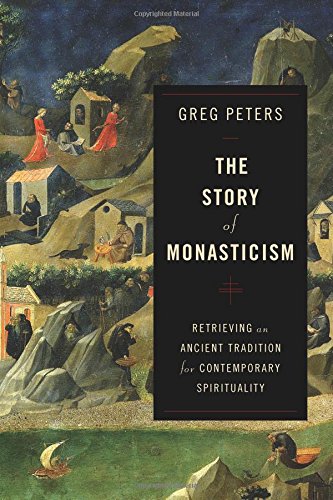Reviewed by J. Stephen Yuille
Greg Peters is an Anglican minister and a historian of Christian spirituality at Biola University. In The Story of Monasticism, he traces the monastic movement through four time periods: Anthony to Benedict, Benedict to Bernard, Bernard to Luther, and Luther to Merton. He provides a well-researched and well-organized analysis, explaining the rise of the Anchorites and Cenobites in the Syrian and Egyptian deserts, detailing the spread of Benedictine monasticism throughout Europe during the medieval era, describing the advent of the Cistercians, Carthusians, Hospitallers, Dominicans, Franciscans, Jesuits, and Carmelites, and discussing the developments in monasticism since Vatican II.
In addition to this excellent descriptive analysis, Peters considers important factors that shaped the development of the monastic movement, including the legalization of Christianity in the fourth century, the rise of a mercantile economy in the eleventh century, and the advent of the Protestant Reformation in the sixteenth century.
For those seeking a better understanding of monasticism, the present volume will prove a valuable resource. Peters provides an informative look into the various monastic schools, plus a taste of the many emphases within monastic spirituality: obedience, discipline, humility, contemplation, service, etc. He also highlights what today’s church could learn from the monastic movement; namely, the importance of developing an ordered life (p. 66), cultivating personal virtue (p. 86), creating counter-cultural churches (p. 117), and pursuing simplicity in the midst of a materialistic age (p. 185).
But, with all that said, I must draw the reader’s attention to the book’s subtitle: Retrieving an Ancient Tradition for Contemporary Spirituality. As it implies, Peters’ chief aim in this book isn’t to provide a general introduction to monasticism but a detailed defense of monasticism. That is to say, he writes with a very clear apologetic purpose: to reorient evangelical thinking. He believes evangelicals have misunderstood monasticism and, as a result, they have severed themselves from an invaluable tradition to their own spiritual detriment.
In support of his argument, Peters appeals to biblical texts such as Matthew 3:13–4:1; 6:19; 19:12; Luke 12:33; Acts 2:43–45; and 1 Corinthians 7:1–16. He also seeks to “re-frame” certain perceived negative tendencies within monasticism, thereby placing them in a more favorable light.
Personally, I remain unconvinced of Peters’ apologetic argument. The bridge he seeks to build between Scripture and monasticism is tenuous (particularly his handling of 1 Corinthians 7:1–16). Moreover, his “re-framing” of certain monastic tendencies seems to run contrary to the historical evidence. (See, for example, his explanation of monastic isolationism in terms of “withdrawals and returns.”) Finally, and perhaps most importantly, Peters hasn’t addressed the proverbial “elephant in the room”—namely, monasticism’s underlying theological and philosophical presuppositions. To what extent is monasticism’s emphasis on mysticism/asceticism/isolationism the product of a Platonic/Neo-Platonic/Origenic cosmology?
While benefiting greatly from Peters’ historical analysis of monasticism and while appreciating the lessons he puts forward for today’s church, I find myself disagreeing with his main apologetic argument. But this won’t prevent me from recommending his book to anyone seeking a helpful historical overview of monasticism.
Dr. J. Stephen Yuille is Pastor of Grace Community Church, Glen Rose, TX, Associate Professor of Biblical Spirituality, The Southern Baptist Theological Seminary, Louisville, KY, and Book Review Editor for Spirituality and Christian Living at Books At a Glance.
